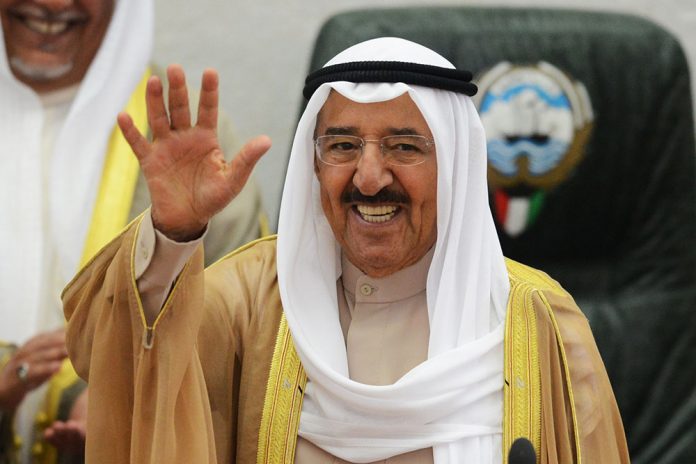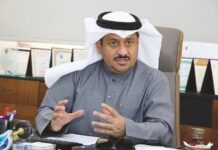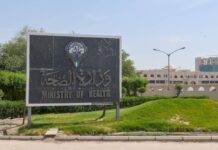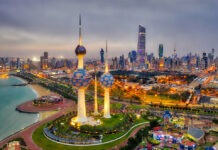His Highness the Amir Sheikh Sabah AlAhmad AlJaber AlSabah’s interest in foreign politics began in 1963 and he had served in the foreign affairs’ post for many years, thus earning him the name “father of diplomacy.
Uniquely, the Kuwaiti foreign policy, as engineered by His Highness Sheikh Sabah AlAhmad, has been based on “golden bases:” Diplomatic, political, economic, humanitarian factors as well as mediation for resolving nations’ disputes.
Popular as a calm, balanced and flexible politician, quarreling states have often sought His Highness Sheikh Sabah AlAhmad’s mediation to iron out their differences and he has indeed succeeded in reaching just settlements to a large number of Arab, regional and international crises.
Kuwait has a long experience in settling interArab disputes, such as mediation among the Yemenis in the 60s and between northern and southern Yemen in 1972. Sheikh Sabah AlAhmad AlSabah visited the two parts of Yemen, succeeded in halting armed skirmishes and worked out a political settlement.
Two years earlier, Sheikh Sabah AlAhmad scrambled to resolve a violent PalestinianJordanian dispute. Also in the 60s, Kuwait organized many meetings for representatives of the Iranian and Bahraini governments at the Kuwaiti diplomatic mission in Geneva, succeeding in drawing up a settlement that was referred to the United Nations.
In the 80s, Kuwait mediated between Oman and Yemen, hosting meetings of the two countries’ foreign ministers that ended with an agreement on halting “a media war” between them, respecting good neighborliness’ principles and each other’s sovereignty, in addition to the Kuwaiti role for settling SaudiLibyan differences during era of the late leader Col. Moammar AlGadhafi and tackling strains in the UAEOman ties in 2009.
Moreover, His Highness Sheikh Sabah AlAhmad masterminded conciliation among Arab leaders on sidelines of the Arab Economic, Development and Social Summit, held in Kuwait in January 2009.
At the 2009 Arab summit in Qatar, Sheikh Sabah AlAhmad urged summiteers to seriously tackle drawbacks of the muchaspired joint Arab action. Favoring conciliation for lingering differences, Sheikh Sabah AlAhmad attended an Arab summit, hosted by Baghdad in March 2012. His long history of goodwill diplomacy was also seen in his efforts for ending the Lebanese civil war that had dragged on from 1975 to 1989. Amid mounting unrest in Yemen since 2011, Sheikh Sabah AlAhmad scrambled to try spare the Yemenis’ blood.
His efforts at the time capped with the GCC conciliation initiative declared on April 21, 2016. Kuwait had also hosted marathon reconciliation talks among the Yemeni parties. Deeply advocating harmony among the GCC states, Sheikh Sabah AlAhmad had stated, “Tackling the differences among the GCC brothers is a duty that I cannot neglect.”
Lamenting the dangers surrounding the GCC, founded in early 80s, Sheikh Sabah AlAhmad had warned of potential dire consequences as a result of the interGCC rifts. “Our Gulf unity is our unescapable destiny,” Sheikh Sabah AlAhmad has stressed. In October 1982, Kuwait hosted the signing of a conciliation accord between southern Yemen and Oman and played a crucial role for restoring ties between Libya and Saudi Arabia in 1982.
Kuwait stood on Bahrain’s side when it witnessed unrest in 2011 and upon guidelines by Sheikh Sabah, a Kuwaiti delegation visited the country to try bridge the gulf and find a political settlement. Kuwait had responded positively to Manama’s call for deploying units of “the peninsula shield force” to secure strategic installations.
On March 3, 2011, Sheikh Sabah visited the UAE and Oman, successfully working out a brotherly conciliation between the two GCC member states. The year 2014 witnessed a major GCC crisis, prompting His Highness again to visit the countries involved in the dispute to try defuse interGCC tensions.
Qatar had accepted formation of a joint panel to be tasked with implementing the Riyadh accord that had been hammered out on November 23, 2013, among the Saudi King, His Highness the Amir Sheikh Sabah and the Qatari Amir, as well as representatives of other GCC countries.
GCC leaders were expected to meet at the scheduled summit in Qatar in the end of 2014 however, differences reemerged and the stakeholders reached a new deal to organize a summit in Riyadh, which was held in the middle of November. It ended with a declaration that the GCC crisis ended. However, in 2017, the crisis recurred and again Sheikh Sabah AlAhmad responded to the situation by trying to tackle the reappearing rifts.
In July 2017, Kuwait witnessed intensive diplomatic activities in light of His Highness’ mediation. On December 5, 2017, Kuwait hosted the 38th session of the GCC supreme council during which His Highness called again for healing the cracks. In January 2018, Kuwait hosted the 11th session of the GCC legislative assemblies and “shura” councils, in a move that was widely seen as contributing to the efforts for thawing the ice in the ties among the GCC countries.
Dr. Ibrahim AlHadban, professor of political sciences at Kuwait University, affirms that Kuwait has played an effective politicaldiplomatic role since its independence. Mediation among squabbling nations is a tool of the Kuwaiti diplomacy, latter of which constitutes the country’s “soft power,” he says alluding to its humanitarian initiatives, neutrality and supporting justice.
The Kuwaiti foreign diplomacy has been inspired by His Highness Sheikh Sabah AlAhmad long and rich experience in the foreign portfolio, he says, noting Sheikh Sabah’s sagacious and rational approach in addressing diverse thorny issues.
For his part, Dr. Mohammad AlFaili, a renowned Kuwaiti law professor, says Kuwait’s foreign policy has always been marked with averting strifes, promoting cordial ties and backing other nations’ development.

















